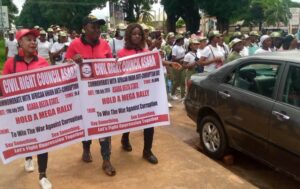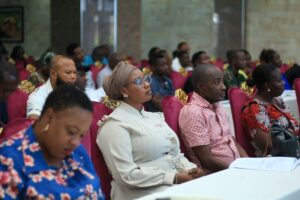Social Action, Stakeholders Task the New FG Administration on the NDDC in a Communique
On 20th June 2023, Alone (Alone) with support from the MacArthur Foundation held a Twitter Space Conversation tagged; “Setting an Agenda for the NDDC under the New Administration”. The Conversation was conceived in the frame of the ongoing project which aims at promoting accountability and effective service delivery by the Niger Delta Development Commission, NDDC”.
This conversation brought together the management staff of the NDDC, civil society organizations, social and development practitioners, citizens of the Niger Delta Regions, and other relevant stakeholders to discuss how best citizens can work with the NDDC to promote accountability and effective service delivery. The space provided an opportunity for all in attendance to constructively discuss how the development of the region can better be championed under the new NDDC leadership.
This conversation had panellists namely the Chairman, of Human and Environmental Development Agenda (HEDA), Olanrewaju Suraju; Executive Director of Centre for Transparency Advocacy, Faith Nwadishi; political economy analyst and legislative scholar, Dr Uche Igwe; Rights Activist and Journalist, Dr Chido Onumah, and the Assistant Director, Public Enlightenment and Education Department of the Independent Corrupt Practices and Other Related Offences Commission (ICPC), Mrs Ese Okwong while the Executive Director of Policy Alert, Tijah Bolton-Akpan moderated the Conversation.
From the discussions that ensued, the following critical observations were made by participants:
OBSERVATIONS
- The people of the Niger Delta have not benefited from the NDDC despite the trillions of naira that have accrued to the Commission over the years.
- The Commission over the years has become manipulated and used for the settlement of political associates and empowerment of the elites at the expense of the people of the region whose lives have been destroyed by oil and gas exploration.
- Those appointed to manage the affairs of the NDDC have shown little interest in the genuine development of the region.
- The people of the region over the years have shown apathy and docility over the activities of the NDDC thus leaving room for a few elites to exploit the commission to their personal benefits
- Accountability institutions like the ICPC, EFCC and the National Assembly have not shown adequate commitment to carrying out effective oversight of the activities of NDDC. The National Assembly specifically have been found to be more interested in the “cake” from the region rather than helping the region to develop.
- The operations of NDDC have continued to be shrouded in deep secrecy hence the reason corruption thrives in the Commission.
- Although the forensic audit of the NDDC was received by the Presidency in September 2021, 22 months after, the Presidency is yet to publish the report nor act on it.
In view of the observations, the following recommendations emerged from the dialogue:
RECOMMENDATIONS
- The new administration must distinguish itself by undertaking serious reforms in the NDDC for the benefit of the people.
- The New Administration should constitute an independent audit board for the NDDC, to carry out regular and continuous audits of NDDC activities and publish such quarterly.
- The new administration should as a matter of urgency, constitute a new NDDC Board.
- The new administration should stop using the NDDC as an institution for political settlement, and appoint only those who have a track record of genuine interest in the course of development of the region.
- The funds of the NDDC is not a gift but an entitlement of the people of the Niger Delta, hence the people and the Civil society organisations must show serious interest in the NDDC revenue inflow and how these resources are spent thus checking corruption.
- There is an urgent need for the National Assembly to go beyond the “off your mic” charade and carry out effective oversight of the activities of the NDDC.
- The ICPC is commended over the Constituency and Executive Projects Tracking Groups (CEPTG) launched to track project infractions. However, the ICPC and other accountability institutions must ensure those found culpable of corrupt practices in the execution of NDDC projects are held to account and hence serve as deterrents to others.
- The new administration should create more rooms for citizens to participate in the NDDC budget processes. A strong consultation process should be established to allow adequate input and participation of community people in the budget process.
- The 10th National Assembly should ensure prompt passage of NDDC Budget to enable the effective utilization of allocated resources. That the NDDC Budget should be made accessible to the public like every other MDA.
- The new administration as a starting point of reform for the NDDC should publish the forensic audit report of the commission hence showing value for the resources spent in the forensic audit and most importantly empower citizens with the necessary tool to set up a tracker that will track the implementation of recommendations in the audit report.
- Civil society organizations should set up a tracker that will track the implementation of recommendations in the audit report.
Signed:
| Alone | Anino Atsekurubu, Acting Executive Director |
| Partners | Niger Delta Budget and Citizens Platform,
Guild of Community Development Advocate in Akwa Ibom State, Centre for Transparency Advocacy Human and Environmental Development Agenda (HEDA) Support & Training Entrepreneurship Program (STEP) Rivers State Anticorruption Network, Delta Civil Society Network, Policy Alert, African Centre for Media and Information Literacy (AFRICMIL) Get A Life Advocacy & Advancement Initiative Imo NDDC Advocates, Ondo Budget Transparency and Accountability Platform (OBTAP) Better Common Life Initiative (BECOLIN). Civil Rights Council
|




